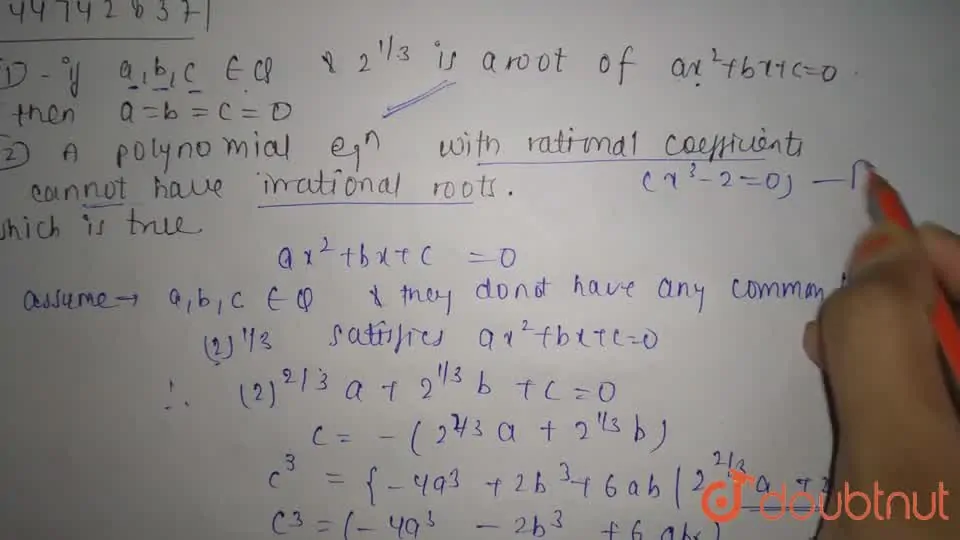Statement-1: Ifa,b,c∈Qand21/3 is a root of ax2+bx+c=0, then a = b = c = 0.
Statement-2: A polynomial equation with rational coefficients cannot have irrational roots.
Statement-1 is True, Statement-2 is True, Statement-2 is a correct explanation for Statement-1.
Statement-1 is True, Statement-2 is True, Statement-2 is not a correct explanation for Statement-1.
Statement-1 is True, Statement-2 is False.
Statement-1 is False, Statement-2 is True.
The correct Answer is:C
Multiplying both sides of ax2+bx+c=0 by the LCM of denominators of rational numbers a, b and c, we obtain a quadratic equation with integer coefficients. So, let us assume that a, b, c are integers and they do not have any common factors.
It is given that 21/3 satisfies ax2+bx+c=0.
∴ 22/3a+21/3b+c=0
⇒ c=−(21/3a+21/3b)
⇒ c3=−{4a3+2b3+6ab(22/3a+21/3b)}
⇒ c3=−4a3−2b3+6abc
⇒ c3=−2(2a3+b3−3abc)
⇒ 2∣c3
⇒ 2∣c
⇒ c=2c1 for some integer c1.
Puttion c=2c1 in (i), we get 8c31=−4a3−2b3+6abc1
⇒ 4c31=−(2a3+b3−6abc1)
⇒ b3=−2(a3+2c31−3abc1)
⇒ 2∣∣b3⇒2∣∣b⇒b=2b1 for some integer b1.
Putting b=2b1andc=2c1 in (i), we get 8c31=−4a3−16b31+24ab1c1
⇒ a3=−2(c31+2b31−3ab1c1)⇒2∣∣a3⇒2∣∣a
This is a contradiction. Therefore, a = b = c = 0.
So, Statement-1 is true.
Statement-2 is false, because x3−2=0 is a polynomial equation with rational coefficients having 21/3 as its root.
Related Playlists
- BOOK - OBJECTIVE RD SHARMA ENGLISHCHAPTER - QUADRATIC EXPRESSIONS AND EQUATIONS EXERCISE - Exercise138videos
QUADRATIC EXPRESSIONS AND EQUATIONS
- BOOK - OBJECTIVE RD SHARMA ENGLISHCHAPTER - QUADRATIC EXPRESSIONS AND EQUATIONS EXERCISE - Chapter Test50videos
QUADRATIC EXPRESSIONS AND EQUATIONS
- BOOK - OBJECTIVE RD SHARMA ENGLISHCHAPTER - QUADRATIC EXPRESSIONS AND EQUATIONS EXERCISE - Section I - Solved Mcqs123videos
QUADRATIC EXPRESSIONS AND EQUATIONS
- BOOK - OBJECTIVE RD SHARMA ENGLISHCHAPTER - PROBABILITY EXERCISE - Chapter Test45videos
PROBABILITY
- BOOK - OBJECTIVE RD SHARMA ENGLISHCHAPTER - SEQUENCES AND SERIESEXERCISE - Chapter Test59videos
SEQUENCES AND SERIES
Similar Questions
Let a, b, c be real numbers such that ax2+bx+c=0andx2+x+1=0 have a common root.
Statement-1: a = b = c
Staement-2: Two quadratic equations with real coefficients cannot have only one imainary root common.View SolutionStatement-1: Ifa,b,c∈Rand2a+3b+6c=0, then the equation ax2+bx+c=0 has at least one real root in (0, 1).
Statement-2: If f(x) is a polynomial which assumes both positive and negative values, then it has at least one real root.View SolutionIf the roots of ax2+bx+c=0 are 2, 32 then (a+b+c)2
View SolutionIf a,b,c,∈R and equations ax2+bx+c=0 and x2+2x+9=0 have a common root then
View SolutionIf 1,2,3 are the roots of the equation x3+ax2+bx+c=0 , then
View SolutionIf a, b, c are odd integers, then the roots of ax2+bx+c=0, if real, cannot be
View SolutionStatement (1) : If a and b are integers and roots of x2+ax+b=0 are rational then they must be integers. Statement (2): If the coefficient of x2 in a quadratic equation is unity then its roots must be integers
View SolutionStatement (1) : If a and b are integers and roots of x2+ax+b=0 are rational then they must be integers. Statement (2): If the coefficient of x2 in a quadratic equation is unity then its roots must be integers
View SolutionIf 1,2,3 and 4 are the roots of the equation x4+ax3+bx2+cx+d=0 then a+2b+c=
View SolutionIf 3+4i is a root of the equation ax2+bx+c=0 where a,b,c∈R then 31a+b+c=
View Solution


